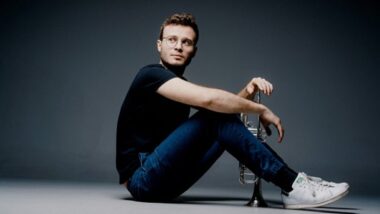 United Kingdom Beethoven, Zimmermann, Bruckner: Simon Höfele (trumpet), BBC National Orchestra of Wales / Ryan Bancroft (conductor). Hoddinott Hall, Cardiff, 10.3.2023. (PCG)
United Kingdom Beethoven, Zimmermann, Bruckner: Simon Höfele (trumpet), BBC National Orchestra of Wales / Ryan Bancroft (conductor). Hoddinott Hall, Cardiff, 10.3.2023. (PCG)

Beethoven – Leonore Overture No.3 Op.72b (1806)
Zimmermann – Trumpet Concerto Nobody knows de trouble I see (1954)
Bruckner – Symphony No.0 in D minor (1869)
The concert, broadcast live on BBC Radio 3, opened with a real bang: a fizzer of a performance of Beethoven’s third Leonore overture. We have now become increasingly accustomed to renditions which treat Beethoven in a strictly classical style. It was something of a novelty, then, to encounter Ryan Bancroft’s unashamedly romantic and dramatic approach to a work which – when all is said and done – even Beethoven regarded as too romantic and dramatic for its originally intended function as a curtain-raiser for his one and only opera. From the very beginning, with a Klemperer-like solemnity of phrase, we were in the presence of a monumental force of nature. The eruption of protest and then turbulent rejoicing were hardly interrupted by the offstage trumpet fanfare played from the nearby corridor outside. One trusts that the sound did not interfere with the performance by Welsh National Opera in the same building!
The themes of drama and political protest continued with the trumpet concerto Nobody knows de trouble I see by Bernd Alois Zimmermann. I last heard it in Cardiff at a 2014 concert given ironically enough by the Welsh National Opera in St David’s Hall. I observed at the time: ‘the international reputation of Bernd Alois Zimmermann rests largely on his opera Die Soldaten, the epitome of avant garde writing for the stage with its stupendously difficult problems both of musical performance and dramatic presentation.’ This earlier score, inspired by the dawning civil rights movement in America, is much more immediately approachable. It was written as a single movement, with the Negro spiritual theme underpinning much of the texture, but it falls into two halves: a jazz-inspired first section and a lamenting blues. Nigel Simeone’s entertaining programme note pointed out not only five saxophones and electric guitar, but the Hammond organ, ‘an instrument heard to startling effect in places’. Here the effect was less immediately apparent; my 2014 review described the performance as ‘sleazy and decadent’. Perhaps the electronic instruments which once seemed so fashionable have nowadays lost the potential to surprise or shock. But I welcomed the revival of the concerto ten years ago, and it was good to hear it again. It has worn much better than Ligeti’s similarly ‘modern’ Violin Concerto which we heard in the hall last December. Simon Höfele played the fiendishly high-lying phrases of the solo part with unabashed enthusiasm and ecstasy, and not a little sweetness in the more lyrical passages.
Bruckner’s suppressed his second symphony after a disastrous initial reception by a conductor to whom he had shown the score; he even robbed it of a number in his symphonic canon. The work was only revived after his death under the new appellation of Die Nullte, and here it received a very rare concert outing. Universal Edition published the score in 1924, edited with a whole raft of suggested tempo indications. Many of those make little sense in the architecture of the work as a whole and were rightly ignored in Ryan Bancroft’s performance. The striding momentum of the first movement, for example, was not allowed to relax into the more lyrical effusions of the second subject. The result not only preserved the unity of the music but created a ferment of excitement which did not require the resort to unwritten accelerations that bedevil so many Bruckner performances. The conductor also took a remarkably broad view of Bruckner’s single marking Andante for the tempo of the second movement, where the editor of the 1924 publication made an admonitory addition sostenuto. This helped extend the impassioned string lines to a thorough-going Brucknerian Adagio which looked forward to the great symphonies of his maturity. The closing bars, where Bruckner does actually ask for a ritenuto, achieved a sense of spiritual repose in the ppp muted strings that were surely precisely what the composer intended. Bancroft also took advantage of the repetitions in the third movement (Scherzo) to introduce new inflections during the recapitulated material. They sparked continued interest and led inexorably to the sudden eruption of the coda. He could do less with the rather ramshackle finale – Bruckner rightly concluded in his later symphonies that he could dispense with the slow introduction he employed here – but the ending still achieved the right sense of Brucknerian catharsis. We could well do with hearing more Bruckner from these performers.
I mentioned Welsh National Opera earlier. In the theatre next door to the hall, they were giving the second performance of the newly commissioned opera Blaze of Glory! The opera was apparently sold out, and yet plenty of classical music enthusiasts were still available to simultaneously furnish a decent-sized audience in the Hoddinott Hall. So much for the complaints of the Cardiff City Council bureaucrats (who seek to divest themselves of responsibility for the upkeep of St David’s Hall) that the demand for classical music events in the city is contracting. And those who missed this concert can catch up with the broadcast on the BBC Sounds service at any time in the next month.
Paul Corfield Godfrey
